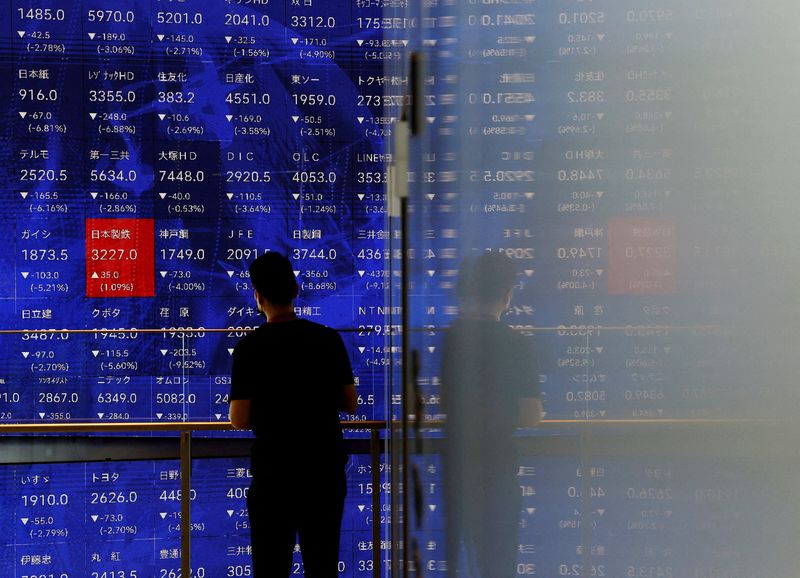
By Jamie McGeever
(Reuters) – A look at the day ahead in Asian markets.
Investors in Asia kick off the new trading month on the front foot, optimistic about a U.S. ‘soft landing’ and dovish Fed outlook, which should help boost risk appetite and the appeal of emerging market assets.
The recent slide in the dollar, falling U.S. bond yields and global equity bounce have resulted in a significant loosening of financial conditions that is fueling a virtuous cycle of increasing bullishness.
Data last week showed U.S. growth beating forecasts and inflation cooling, just as the Fed is about to start its easing cycle later this month. Add in a decent Q2 earnings season, and a ‘Goldilocks’ scenario is clearly emerging.
As ever though, the danger at times like this is complacency – episodes like the Aug. 5 volatility shock are always lurking, and next time the impact may not be so fleeting. And there’s also China.
China’s ‘official’ purchasing managers index data on Saturday gave the first insight into how the world’s second largest economy performed in August, and it made for sobering reading – factory activity is flagging, deflationary pressures are intensifying, and the need for stimulus is growing.
Manufacturing activity sank to a six-month low, contracting for a fourth straight month as factory gate prices tumbled and owners struggled for orders. Services activity picked up pace, but growth in the sector is barely visible.
In fact, the composite PMI slipped to 50.1, the lowest since December 2022 when China’s economy re-opened, signaling almost no growth at all.
China’s ‘unofficial’ manufacturing PMI will be released on Monday. The Caixin PMI index is expected to rise to 50.0 from 49.8, essentially moving to ‘no growth’ from slight contraction. Manufacturing PMIs from across Asia, including Japan, India, Australia and South Korea, will also be released.
Traders will also be keeping a close eye on the yuan, which is its strongest level against the U.S. dollar in 15 months amid growing corporate demand for the currency and as U.S. rate cuts come into view.
Overall liquidity and market activity will be lighter than usual with U.S. markets closed on Monday for Labor Day, but the backdrop generally remains constructive.
According to Goldman Sachs’s indices, emerging market financial conditions are the loosest in over a year, U.S. conditions are the loosest in more than two years, and global conditions the loosest in nearly two-and-a-half years.
The 10-year U.S. Treasury yield fell 20 basis points in August, the fourth consecutive month it has declined.
The S&P 500 rose for a fourth straight month back to within touching distance of July’s record high, the MSCI World index did hit a new high, while the MSCI Asia ex-Japan index rose for a sixth month from the last seven.
Here are key developments that could provide more direction to Asian markets on Monday:
– China, Japan & others’ manufacturing PMIs (August)
– Indonesia inflation (August)
– Australia company profits (Q2)
(Reporting by Jamie McGeever; editing by Diane Craft)
EMEA Tribune is not involved in this news article, it is taken from our partners and or from the News Agencies. Copyright and Credit go to the News Agencies, email news@emeatribune.com Follow our WhatsApp verified Channel





